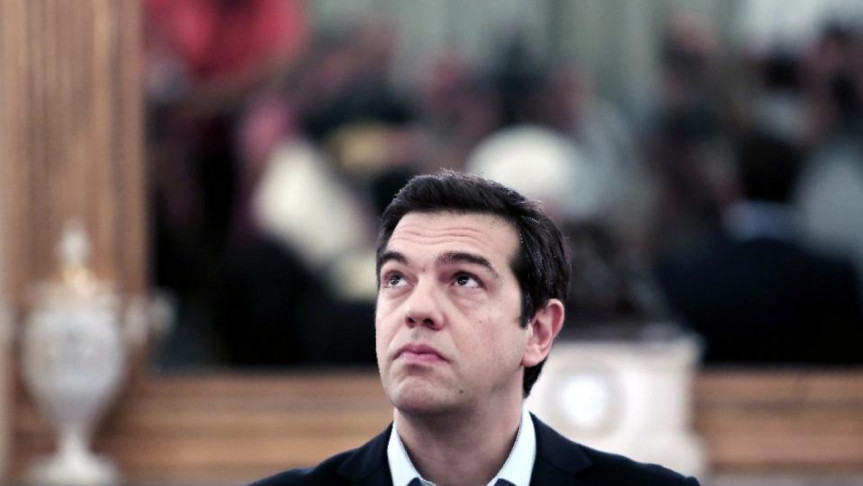Banks reopen in Greece after three-week shutdown

Athens: Greek banks reopened on Monday after a shutdown lasting three weeks imposed by the government to avert a crash in the banking system over the country's debt crisis.
However, capital controls in force since 29 June remain in place, although a daily cash withdrawal limit of 60 euros ($65.03) has now been relaxed to a weekly restriction of 420 euros.
The shutdown is estimated to have cost the economy some 3.0 billion euros ($3.3 billion) in market shortages and export disruption, with a block on money transfers to foreign banks and a ban on the opening of new accounts still active.
The government is meanwhile expected to make a 4.2-billion euro payment Monday to the European Central Bank (ECB), made possible by the granting of a short-term loan of 7.16 billion euros by the European Union on Friday.
The loan will also enable Athens to repay debts to the International Monetary Fund (IMF) outstanding since June.
Greece last week had to agree to a tough fiscal package to earn a three-year bailout from its international creditors and avoid crashing out of the eurozone.
German Chancellor Angela Merkel on Sunday reiterated Berlin’s tough stance ruling out debt forgiveness for Greece, but added that her government was open to more flexibility in Athens’ repayment schedule.
Crisis-hit Greeks will now be taxed at 23 per cent, up from 13 per cent, on everything from sugar and cocoa to condoms, taxis and funerals.
To sweeten the pill, the tax on medicines, books and newspapers eases from 6.5 per cent to 6.0 per cent.
For the first time in months, technical teams representing the creditors — the European Union, the European Central Bank and the International Monetary Fund — are expected in Athens in the coming week to assess the state of the economy.
The austerity package caused a mutiny among lawmakers of the ruling radical Syriza party, forcing Prime Minister Alexis Tsipras to carry out a limited reshuffle on Friday.
Even so, most analysts and even government officials say early elections are now inevitable, and are likely to be held in September.
Merkel’s red line
The premier’s critics accuse him of kowtowing to blackmail by Greece’s creditors, who had threatened to expel the country from the euro.
But the Greek crisis has also exposed a rift between the eurozone’s top powers, Germany and France, on how far to apply austerity to meet fiscal goals.
Merkel held her country’s tough line on any chance of debt restructuring on Sunday, telling public broadcaster ARD that ‘there can’t be a classic haircut — forgiving 30 or 40 per cent of debt — in a monetary union’.
But she noted that Greece had received other forms of debt relief in recent years including a ‘voluntary writedown for private creditors, extended maturities and lower interest rates’.
‘We can discuss possibilities along those lines again,’ she said.
French President Francois Hollande on Sunday called for the euro’s governance to be ‘strengthened’, calling for ‘the addition of a specific budget and a parliament to ensure democratic control’.
Commentators say the lack of centralised governance over national fiscal policies — a jealously-guarded area of sovereignty for member governments — is a major flaw in the single European currency.
‘Crash test’
Meanwhile Tsipras — who barely has time to eat or sleep, according to his mother — faces a fresh challenge in parliament on Wednesday to approve a second wave of reforms tied to its economic rescue.
Pro-government newspaper Avgi on Sunday said the vote would be a ‘crash test’ that could even result in the prime minister’s resignation.
‘If there are new losses, in whatever form, (Tsipras) will hand back his mandate,’ the daily said.
Tsipras’ coalition holds 162 seats in parliament, but in last Wednesday’s vote, only 123 government MPs backed the bailout — just over the minimum 120 required to sustain a minority government.
Nearly a quarter of Syriza’s lawmakers — 39 out of 149 — failed to support the reforms bill, which passed thanks to solid support from opposition parties.
The leftist government has agreed to raise taxes, overhaul its ailing pension system and commit to privatisations it had previously opposed, in exchange for a bailout of up to 86 billion euros over the next three years.
Nobel prize winning economist Paul Krugman, a vocal supporter of Athens in its long-running bailout saga, said Sunday that he ‘may have overestimated the competence of the Greek government,’ suggesting Syriza staged the showdown without having a Plan B.
The draconian agreement — accepted by a party that came to power in January promising to end austerity — came after more than 61 per cent of Greeks on July 5 rejected further cuts in a referendum called by Tsipras himself.

 AFP
AFP




